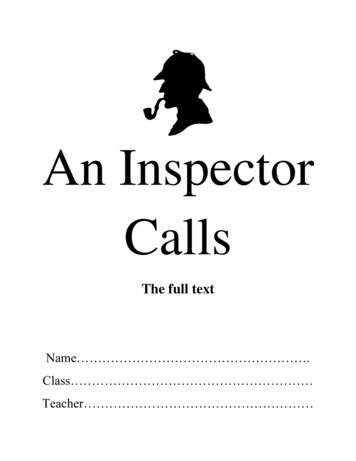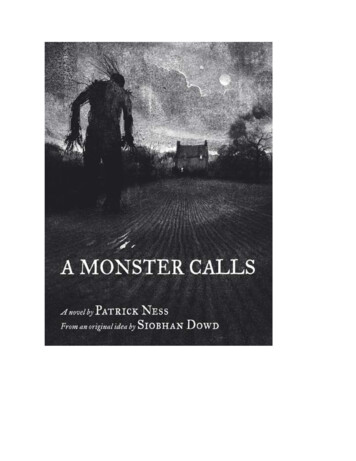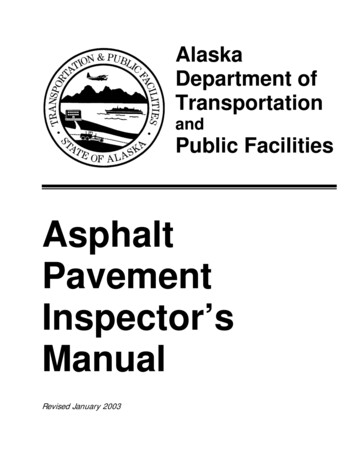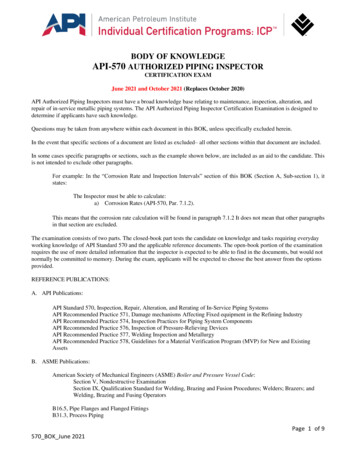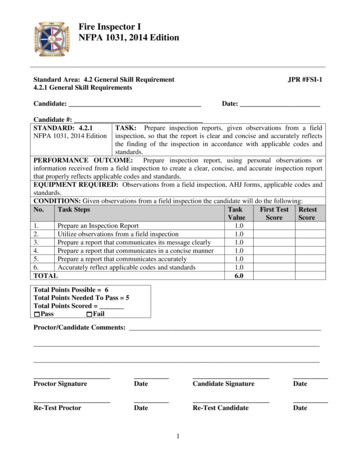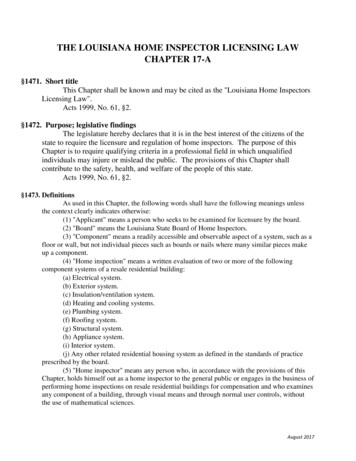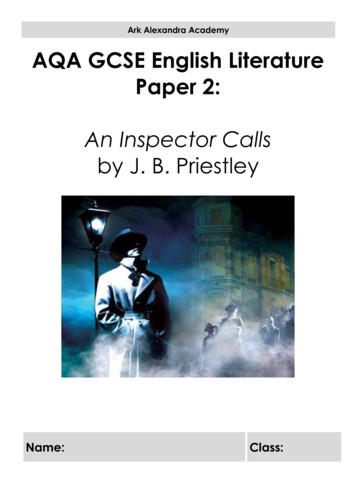
Transcription
Ark Alexandra AcademyAQA GCSE English LiteraturePaper 2:An Inspector Callsby J. B. PriestleyName:Class:
CONTENTS:Act One3Act Two33Act Three60Practice Exam Questions87All three acts, which are continuous, take place in the dining room of theBirlings’ house in Brumley, an industrial city in the north Midlands. It is anevening in spring, 1912.2
Act OneThe dining room is of a fairly large suburban house, belonging to aprosperous manufacturer. It has a good solid furniture of the period. The generaleffect is a substantial and heavily comfortable but not cosy and homelike. (If arealistic set is used, then it should be swung back, as it was in the production atthe new theatre. By doing this, you can have the dining-table centre downstageduring act one, when it is needed there, and then swinging back, can reveal thefireplace for act two, and then for act three can show a small table with atelephone on it, downstage of the fireplace; and by this time the dining-table andit chairs have moved well upstage. Producers who wish to avoid this trickybusiness, which involves two re-settings of the scene and some very accurateadjustments of the extra flats necessary would be well advised to dispense withan ordinary realistic set if only because the dining-table becomes a nuisance. Thelighting should be pink and intimate until the INSPECTOR arrives and then itshould be brighter and harder.)At rise of curtain, the four Birling's and Gerald are seated at the table,with Arthur Birling at one end, his wife at the other, Eric downstage and Sheilaand Gerald seated upstage. EDNA, the parlour maid, is just clearing the table,which has no cloth, of the dessert plates and champagne glasses, etc, and thenreplacing them with decanter of port, cigar box and cigarettes. Port glasses arealready on the table. All five are in evening dress of the period, the men in tailsand white ties, not dinner jackets. Arthur Birling is a heavy-looking, ratherportentous man in this middle fifties with fairly easy manners but ratherprovincial in this speech. His wife is about fifty, a rather cold woman and herhusband's social superior. Sheila is a pretty girl in her early twenties, verypleased with life and rather excited. Gerald Croft is an attractive chap aboutthirty, rather too manly to be a dandy but very much the well-bred young manabout-town. Eric is in his early twenties, not quite at ease, half shy, halfassertive. At the moment they have all had a good dinner, are celebrating aspecial occasion, and are pleased with themselves.Arthur Birling: Giving us the port, Edna? That’s right. (He pushes it towardsEric.) you ought to like this port, Gerald, as a matter of fact, Finchley told meit's exactly the same port your father gets from him.3
Gerald: Then it'll be all right. The governor prides himself on being a goodjudge of port. I don’t pretend to know much about it.Sheila: (gaily, possessively) I should jolly well think not, Gerald, I'd hateyou to know all about port – like one of these purple-faced old men.Arthur Birling: here, I’m not a purple-faced old man.Sheila Birling: no, not yet. But then you don't know all about port – do you?Birling: (noticing that his wife has not taken any) Now then, Sybil, you musta take a little tonight. Special occasion, y'know, eh?Sheila: Yes, go on, mummy. You must drink our health.Mrs Birling : (smiling) Very well, then. Just a little, thank you. (To Edna, whois about to go, with tray.) all right, Edna. I'll ring from the drawing room whenwe want coffee. Probably in about half an hour.Edna: (going) Yes, ma'am.// Edna goes out. They now have all the glasses filled. Birling beams at themand clearly relaxes.//Birling: Well, well – this is very nice. Very nice. Good dinner too, Sybil. Tellcook from me.Gerald: (politely) Absolutely first class.Mrs Birling: (reproachfully) Arthur, you're not supposed to say such thingsBirling: Oh – come come – I’m treating Gerald like one of the family. AndI'm sure he won't object.Sheila: (with mocking aggressiveness) Go on, Gerald – just you object!Gerald: (smiling) Wouldn't dream of it. In fact, I insist upon being one of4
the family now. I've been trying long enough, haven't I? (as she does not reply,with more insistence.) Haven't I? You know I have.Mrs Birling: (smiling) Of course she does.Sheila: (half serious, half playful) Yes – except for all last summer, whenyou never came near me, and I wondered what had happened to you.Gerald: And I’ve told you – I was awfully busy at the works all that time.Sheila: (same tone as before) Yes, that’s what you say.Mrs Birling: Now, Sheila, don't tease him. When you're married you'llrealize that men with important work to do sometimes have to spend nearly alltheir time and energy on their business. You'll have to get used to that, just asI had.Sheila: I don't believe I will. (half playful, half serious, to Gerald.) So yoube careful.Gerald: Oh – I will, I will.//Eric suddenly guffaws. His parents look at him.//Sheila: (severely) Now – what's the joke?Eric: I don't know – really. Suddenly I felt I just had to laugh.Sheila: You're squiffy.Eric: I’m not.Mrs Birling: What an expression, Sheila! Really, the things you girls pick upthese days!Eric: If you think that's the best she can doSheila: Don't be an ass, Eric.5
Mrs Birling: Now stop it, you two. Arthur, what about this famous toast ofyours?Birling: Yes, of course. (clears his throat.) Well, Gerald, I know you agreedthat we should only have this quiet little family party. It's a pity Sir George and– we – Lady Croft can't be with us, but they're abroad and so it can't be helped.As I told you, they sent me a very nice cable – couldn't be nicer. I'm not sorrythat we're celebrating quietly like thisMrs Birling: Much nicer really.Gerald: I agree.Birling: So do I, but it makes speech-making more difficultEric: (not too rudely) Well. Don't do any. We'll drink their health and havedone with it.Birling: No, we won't. It's one of the happiest nights of my life. And oneday, I hope, Eric, when you've a daughter of your own, you'll understand why.Gerald, I’m going to tell you frankly, without any pretences, that your engagementto Sheila means a tremendous lot to me. She'll make you happy, and I’m sure you'llmake her happy. You're just the kind of son-in-law I always wanted. Your fatherand I have been friendly rivals in business for some time now – though Croftslimited are both older and bigger than Birling and company – and now you'vebrought us together, and perhaps we may look forward to the time when Croftsand Birlings are no longer competing but are working together – for lower costsand higher prices.Gerald: Hear, hear! And I think my father would agree to that.Mrs Birling: Now, Arthur, I don't think you ought to talk business on anoccasion like this.Sheila: Neither do I. All wrong.Birling: Quite so, I agree with you. I only mentioned it in passing. What I6
did want to say was – that Sheila’s a lucky girl – and I think you're a prettyfortunate young man too, Gerald.Gerald: I know I am – this once anyhow.Birling: ( raising his glass) So here's wishing the pair of you – the very bestthat life can bring. Gerald and Sheila.Mrs Birling: (raising her glass, smiling) Yes, Gerald. Yes, Sheila darling. Ourcongratulations and very best wishes!Gerald: Thank you.Mrs Birling: Eric!Eric: (rather noisily) All the best! She's got a nasty temper sometimes –but she's not bad really. Good old Sheila!Sheila: Chump! I can't drink to this, can I? When do I drink?Gerald: You can drink to me.Sheila: (quite and serious now) All right then. I drink to you, Gerald.//for a moment they look at each other//Gerald: (quietly) Thank you. And I drink to you – and hope I can make youas happy as you deserve to be.Shelia: (trying to be light and easy) You be careful – or I’ll start weeping.Gerald: (smiling) Well, perhaps this will help to stop it. (he produces a ringcase.)Sheila: (excited) Oh – Gerald – you’ve got it – is it the one you wanted meto have?Gerald: (giving the case to her) Yes – the very one.7
Sheila: (taking out the ring) Oh – it's wonderful! Look – mummy – isn't it abeauty? Oh – darling (she kisses Gerald hastily.)Eric: steady the buffs!Sheila: (who has put the ring on, admiringly) I think it's perfect. Now Ireally feel engaged.Mrs Birling: So you ought, darling. It's a lovely ring. Be careful with it.Sheila: careful! I'll never let it go out of my sight for an instant.Mrs Birling: (smiling) Well, it came just at the right moment. That wasclever of you, Gerald. Now, Arthur, if you've no more to say, I think Sheila and Ihad better go into the drawing room and leave you menBirling: (rather heavily) I just want to say this.(noticing that Sheila is stilladmiring her ring.) are you listening, Sheila? This concerns you too. And after allI don't often make speeches at you Sheila: I’m sorry, Daddy. Actually I was listening.//she looks attentive, as they all do. He holds them for a moment beforecontinuing.//Birling: I’m delighted about this engagement and I hope it won't be too longbefore you're married. And I want to say this. There's a good deal of silly talkabout these days – but – and I speak as a hard-headed business man, who has totake risks and know what he's about – I say, you can ignore all this silly pessimistictalk. When you marry, you'll be marrying at a very good time. Yes, a very goodtime – and soon it'll be an even better time. Last month, just because the minerscame out on strike, there's a lot of wild talk about possible labour trouble in thenear future. Don't worry. We've passed the worst of it. We employers at lastare coming together to see that our interests – and the interests of capital – areproperly protected. And we're in for a time of steadily increasing prosperity.8
Gerald: I believe you're right, Sir.Eric: What about war?Birling: Glad you mentioned it, Eric. I'm coming to that. Just because thekaiser makes a speech or two, or a few German officers have too much to drinkand begin taking nonsense, you'll hear some people say that war's inevitable. Andto that I say – fiddlesticks! The Germans don't want war. Nobody wants war,except some half-civilized folks in the Balkans. And why? There's too much atstake these days. Everything to lose and nothing to gain by war.Eric: Yes, I know – but still Birling: Just let me finish, Eric. You've a lot to learn yet. And I’m taking asa hard headed, practical man of business. And I say there isn't a chance of war.The world's developing so fast that it'll make war impossible. Look at theprogress we're making. In a year or two we'll have aeroplanes that will be able togo anywhere. And look at the way the auto-mobile's making headway – bigger andfaster all the time. And then ships. Why, a friend of mine went over this newliner last week – the Titanic – she sails next week – forty-six thousand eighthundred tons – New York in five days – and every luxury – and unsinkable,absolutely unsinkable. That's what you've got to keep your eye on, facts like that,progress like that – and not a few German officers taking nonsense and a fewscaremongers here making a fuss about nothing. Now you three young people, justlisten to this – and remember what I’m telling you now. In twenty or thirty year'stime – let's say, in 1940 – you may be giving a little party like this – your son ordaughter might be getting engaged – and I tell you, by that time you'll be livingin a world that'll have forgotten all these capital versus labour agitations and allthese silly little war scares. There'll be peace and prosperity and rapid progresseverywhere – except of course in Russia, which will always be behindhandnaturally.Mrs Birling: Arthur!// has Mrs Birling shows signs of interrupting.//Birling: Yes, my dear, I know – I’m talking too much. But you youngsters justremember what I Said. We can't let these Bernard Shaws and H.G.Wellses do all9
the talking. We hard-headed practical business men must say somethingsometime. And we don't guess – we've had experience - and we know.Mrs Birling. (rising. The others rise) Yes, of course, dear. Well don't keepGerald in here too long. Eric – I want you a minute.// she and Sheila and Eric go out. Birling and Gerald sit down again.//Birling: Cigar?Gerald: No, thanks. Can't really enjoy them.Birling: (taking one himself) Ah, you don't know what you're missing. I likea good cigar. (indicating decanter.) help yourself.Gerald: Thank you.// Birling lights his cigar and Gerald, who had lit a cigarette, helps himselfto port, then pushes the decanter to Birling.//Birling: Thanks. (confidentially.) by the way, there's something I’d like tomention – in strict confidence – while we're by ourselves. I have an idea that yourmother – Lady Croft – while she doesn't object to my girl – feels you might havedone better for yourself socially //Gerald, rather embarrassed, begins to murmur some dissent, but Birlingchecks him.//no, Gerald, that's all right. Don't blame her. She comes from an old countryfamily – landed people and so forth – and so it's only natural. But what I wantedto say is – there's a fair chance that I might find my way into the next honourslist. Just a knighthood, of course.Gerald: Oh – I say – congratulations!Birling: Thanks, but it's a bit too early for that. So don't say anything. ButI’ve had a hint or two. You see, I was Lord Mayor here two years ago when royaltyvisited us. And I’ve always been regarded as a sound useful party man. So – well10
– I gather there's a very good chance of a knighthood – so long as we behaveourselves, don't get into the police court or start a scandal – eh? ( laughscomplacently.)Gerald: (laughs) You seem to be a nice well-behaved family Birling: We think we are Gerald: So if that's the only obstacle, Sir , I think you might as well acceptmy congratulations now.Birling: No, no, I couldn't do that. And don't say anything yet.Gerald: Not even to my mother? I know she'd be delighted.Birling: Well, when she comes back, you might drop a hint to her. And youcan promise her that we'll try to keep out of trouble during the next few months.//they both laugh. Eric enters//Eric: What's the joke? Started telling stories?Birling: No. want another glass of port?Eric: (sitting down) Yes, please. (takes decanter and helps himself.) mothersays we mustn't stay too long. But I don't think it matters. I left'em talkingabout clothes again. You'd think a girl had never any clothes before she getsmarried. Women are potty about 'em.Birling: Yes, but you've got to remember, my boy, that clothes meansomething quite different to a woman. Not just something to wear – and not onlysomething to make 'em look prettier – but – well, a sort of sign or token of theirself-respect.Gerald: That's true.Eric: (eagerly) Yes, I remember – (but he checks himself.)11
Birling: Well, what do you remember?Eric: (confused) Nothing.Birling: Nothing?Gerald: (amused) Sounds a bit fishy to me.Birling: (taking it in the same manner) Yes, you don't know what some ofthese boys get up to nowadays. More money to spend and time to spare than Ihad when I was Eric’s age. They worked us hard in those days and kept us shortof cash. Thought even then – we broke out and had a bit of fun sometimes.Gerald: I’ll bet you did.Birling: (solemnly) But this is the point. I don't want to lecture you twoyoung fellows again. But what so many of you don't seem to understand now, whenthings are so much easier, is that a man has to make his own way – has to lookafter himself – and his family too, of course, when he has one – and so long as hedoes that he won't come to much harm. But the way some of these cranks talkand write now, you'd think everybody has to look after everybody else, as if wewere all mixed up together like bees in a hive – community and all that nonsense.But take my word for it, you youngsters – and I’ve learnt in the good hard schoolof experience – that a man has to mind his own business and look after himselfand his own – and // we hear the sharp ring of a door bell. Birling stops to listen.//Eric: Somebody at the front door.Birling: Edna'll answer it. Well, have another glass of port, Gerald – and thenwe'll join the ladies. That'll stop me giving you good advice.Eric: Yes, you've piled it on a bit tonight, father.Birling: Special occasion. And feeling contented, for once, I wanted you tohave the benefit of my experience.12
// Edna enters//Edna: Please, Sir, an Inspector's called.Birling: An Inspector? What kind of Inspector?Edna: A police Inspector. He says his name's Inspector Goole.Birling: Don't know him. Does he want to see me?Edna: Yes, Sir. He says it's important.Birling: All right, Edna. Show him in here. Give us some more light.// Edna does, then goes out.//I’m still on the bench. It may be something about a warrant.Gerald: (lightly) Sure to be. Unless Eric’s been up to something. (noddingconfidentially to Birling.) and that would be awkward, wouldn't it?Birling: (humorously ) Very.Eric: (who is uneasy, sharply) Here, what do you mean?Gerald: (lightly) Only something we were talking about when you were out.A joke really.Eric: (still uneasy) Well, I don't think it's very funny.Birling: (sharply, staring at him) what's the matter with you?Eric: (defiantly) Nothing.Edna: (opening door, and announcing) Inspector Goole.// The Inspector enters, and Edna goes, closing door after her. TheInspector need not be a big man but he creates at once an impression of13
massiveness, solidity and purposefulness. He is a man in his fifties, dressed in aplain darkish suit of the period. He speaks carefully, weightily, and has adisconcerting habit of looking hard at the person he addresses before actuallyspeaking.//Inspector: Mr Birling?Birling: Yes. Sit down, Inspector.Inspector: (sitting) Thank you, Sir.Birling: Have a glass of port – or a little whisky?Inspector: No, thank you, Mr Birling. I'm on duty.Birling: You're new, aren't you?Inspector: Yes, Sir. Only recently transferred.Birling: I thought you must be. I was an alderman for years – and lord mayortwo years ago – and I’m still on the bench – so I know the Brumley police officespretty well – and I thought I’d never seen you before.Inspector: Quite so.Birling: Well, what can I do for you? Some trouble about a warrant?Inspector: No, Mr Birling.Birling: (after a pause, with a touch of impatience) Well, what is it then?Inspector: I’d like some information, if you don't mind, Mr Birling. Twohours ago a young woman died on the infirmary. She'd been taken there thisafternoon because she'd swallowed a lot of strong disinfectant. Burnt her insideout, of course.Eric: (involuntarily) My God!14
Inspector: Yes, she was in great agony. They did everything they could forher at the infirmary, but she died. Suicide, of course.Birling: (rather impatiently) Yes, yes. Horrid business. But I don'tunderstand why you should come here, Inspector –Inspector: (cutting through, massively) I’ve been round to the room shehad, and she'd left a letter there and a sort of diary. Like a lot of these youngwomen who get into various kinds of trouble, she'd used more than one name. Buther original name – her real name – was Eva Smith.Birling: (thoughtfully) Eva Smith?Inspector: Do you remember her, Mr Birling?Birling: (slowly) No – I seem to remember hearing that name – Eva Smith –somewhere. But it doesn't convey anything to me. And I don't see where I comeinto this.Inspector: She was employed in your works at one time.Birling: Oh – that's it, is it? Well, we've several hundred young womenthere, y'know, and they keep changing.Inspector: This young women, Eva Smith, was out of the ordinary. I founda photograph of her in her lodgings. Perhaps you'd remember her from that.// Inspector takes a photograph, about postcard size, out of his pocket andgoes to Birling. Both Gerald and Eric rise to have a look at the photograph, butthe Inspector interposes himself between them and the photograph. They aresurprised and rather annoyed. Birling stares hard, and with recognition, at thephotograph, which the Inspector then replaces in his pocket.//Gerald: (showing annoyance) Any particular reason why I shouldn't see thisgirl's photograph, Inspector?Inspector: (coolly, looking hard at him) There might be.15
Eric: And the same applies to me, I suppose?Inspector: Yes.Gerald: I can't imagine what it could be.Eric: Neither can I.Birling: And I must say, I agree with them, Inspector.Inspector: It's the way I like to go to work. One person and one line ofinquiry at a time. Otherwise, there's a muddle.Birling: I see. Sensible really. (moves restlessly, then turns.) you've hadenough of that port, Eric.// the Inspector is watching Birling and now Birling notices him.//Inspector: I think you remember Eva Smith now don't you. Mr Birling?Birling: Yes, I do. She was one of my employees and then I discharged her.Eric: Is that why she committed suicide? When was this, father?Birling: Just keep quiet, Eric, and don't get excited. This girl left us nearlytwo years ago. Let me see – it must have been in the early autumn of nineteenten.Inspector: Yes. End of September, nineteen-ten.Birling: That's right.Gerald: Look here, Sir. Wouldn't you rather I was out of this?Birling: I don't mind your being here, Gerald. And I’m sure you've noobjection, have you, Inspector? Perhaps I ought to explain first that this is MrGerald Croft – the son of Sir George Croft – you know, Crofts limited.16
Inspector: Mr Gerald Croft, eh?Birling: Yes. Incidentally we've been modestly celebrating his engagementto my daughter, Sheila.Inspector: I see. Mr Croft is going to marry miss Sheila Birling?Gerald: (smiling) I hope so.Inspector: (gravely) Then I'd prefer you to stay.Gerald: (surprised) Oh – all right.Birling: (somewhat impatiently) Look – there's nothing mysterious – orscandalous – about this business – at least not so far as I’m concerned. It'sperfectly straightforward case, and as it happened more than eighteen monthsago – nearly two years ago – obviously it has nothing whatever to do with thewretched girl's suicide. Eh, Inspector?Inspector: No, Sir. I can't agree with you there.Birling: Why not?Inspector: Because what happened to her then may have determined whathappened to her afterwards, and what happened to her afterwards may havedriven her to suicide. A chain of events.Birling: Oh well – put like that, there's something in what you say. Still, Ican't accept any responsibility. If we were all responsible for everything thathappened to everybody we'd had anything to do with, it would be very awkward,wouldn't it?Inspector: Very awkward.Birling: We'd all be in an impossible position, wouldn't we?Eric: By jove, yes. And as you were saying, Dad, a man has to look afterhimself17
Birling: Yes, well, we needn't go into all that.Inspector: Go into what?Birling: Oh – just before you came – I’d been giving these young men a littlegood advice. Now – about this girl, Eva Smith. I remember her quite well now. Shewas a lively good-looking girl – country-bred, I fancy – and she'd been working inone of our machine shops for over a year. A good worker too. In fact, the foremanthere told me he was ready to promote her into what we call a leading operator– head of a small group of girls. But after they came back from their holidaysthat august, they were all rather restless, and they suddenly decided to ask formore money. They were averaging about twenty-two and six, which was neithermore nor less than is paid generally in our industry. They wanted the rates raisedso that they could average about twenty-five shillings a week. I refused, ofcourse.Inspector: Why?Birling: (surprised) Did you say 'why?'?Inspector: Yes. Why did you refuse?Birling: Well, Inspector, I don't see that it's any concern of yours how Ichoose to run my business. Is it now?Inspector: It might be, you know.Birling: I don't like that tone.Inspector: I’m sorry. But you asked me a question.Birling: And you asked me a question before that, a quite unnecessaryquestion too.Inspector: It's my duty to ask questions.Birling: Well it's my duty to keep labour costs down. And if I’d agreed to18
this demand for a new rate we'd have added about twelve per cent to our labourcosts. Does that satisfy you? So I refused. Said I couldn't consider it. We werepaying the usual rates and if they didn't like those rates, they could go and worksomewhere else. It's a free country, I told them.Eric: It isn't if you can't go and work somewhere else.Inspector: Quite so.Birling: (to Eric) Look – just you keep out of this. You hadn't even startedin the works when this happened. So they went on strike. That didn't last long,of course.Gerald: Not if it was just after the holidays. They'd be all broke – if I knowthem.Birling: Right, Gerald. They mostly were. And so was the strike, after aweek or two. Pitiful affair. Well, we let them all come back – at the old rates –except the four or five ring-leaders, who'd started the trouble. I went downmyself and told them to clear out. And this girl. Eva Smith, was one of them,she'd had a lot to say – far too much – so she had to go.Gerald: You couldn't have done anything else.Eric: He could. He could have kept her on instead of throwing her out. I callit tough luck.Birling: Rubbish! If you don't come down sharply on some of these people,they'd soon be asking for the earth.Gerald: I should say so!Inspector: They might. But after all it's better to ask for the earth thanto take it.Birling: (staring at the Inspector) What did you say your name was,Inspector?19
Inspector: Goole. G. double O-L-E.Birling: How do you get on with our chief constable, Colonel Roberts?Inspector: I don't see much of him.Birling: Perhaps I ought to warn you that he's an old friend of mine, andthat I see him fairly frequently. We play golf together sometimes up at the westBrumley.Inspector: (dryly) I don't play golf.Birling: I didn't suppose you did.Eric: (bursting out) Well, I think it's a dam' shame.Inspector: No, I’ve never wanted to play.Eric: No, I mean about this girl – Eva Smith. Why shouldn't they try forhigher wages? We try for the highest possible prices. And I don't see why sheshould have been sacked just because she'd a bit more spirit than the others.You said yourself she was a good worker. I'd have let her stay.Birling: (rather angrily) Unless you brighten your ideas, you'll never be in aposition to let anybody stay or to tell anybody to go. It's about time you learntto face a few responsibilities. That's something this public-school-and-varsitylife you've had doesn't seem to teach you.Eric: (sulkily) Well, we don't need to tell the Inspector all about that, dowe?Birling: I don't see we need to tell the Inspector anything more. In fact,there's nothing I can tell him. I told the girl to clear out, and she went. That'sthe last I heard of her. Have you any idea what happened to her after that? Getinto trouble? Go on the streets?Inspector: (rather slowly) No, she didn't exactly go on the streets.20
//Sheila has now entered//Sheila: (gaily) What's this about streets? (noticing the Inspector.) Oh –sorry. I didn't know. Mummy sent me in to ask you why you didn't come along tothe drawing-room.Birling: We shall be along in a minute now. Just finishing.Inspector: I’m afraid not.Birling: (abruptly) There's nothing else, y'know. I've just told you that.Sheila: What's all this about?Birling: Nothing to do with you, Sheila. Run along.Inspector: No, wait a minute, Miss Birling.Birling: (angrily) Look here, Inspector, I consider this uncalled-for andofficious. I've half a mind to report you. I've told you all I know – and it doesn'tseem to me very important – and now there isn't the slightest reason why mydaughter should be dragged into this unpleasant business.Sheila: (coming father in) What business? What's happening?Inspector: (impressively) I'm a police Inspector, miss Birling. Thisafternoon a young woman drank some disinfectant, and died, after several hoursof agony, tonight in the infirmary.Sheila: Oh – how horrible! Was it an accident?Inspector: No. she wanted to end her life. She felt she couldn't go on anylonger.Birling: Well, don't tell me that's because I discharged her from myemployment nearly two years ago.Eric: That might have started it.21
Sheila: Did you, Dad?Birling: Yes. The girl had been causing trouble in the works. I was quitejustified.Gerald: Yes, I think you were. I know we'd have done the same thing. Don'tlook like that Sheila.Sheila: (rather distressed) Sorry! It's just that I can't help thinking aboutthis girl – destroying herself so horribly – and I’ve been so happy tonight. Oh Iwish you hadn't told me. What was she like? Quite young?Inspector: Yes. Twenty-four.Sheila: Pretty?Inspector: She wasn't pretty when I saw her today, but she had beenpretty – very pretty.Birling: That's enough of that.Gerald: And I don't really see that this inquiry gets you anywhere,Inspector. It's what happened to her since she left Mr Birling's works that isimportant.Birling: Obviously. I suggested that some time ago.Gerald: And we can't help you there because we don't know.Inspector: (slowly) Are you sure you don't know.// He looks at Gerald, then at Eric, then at Sheila.//Birling: And are you suggesting now that one of them knows something aboutthis girl?Inspector: Yes.22
Birling: You didn't come here just to see me, then?Inspector: No.// the other four exchange bewildered and perturbed glances.//Birling: ( with marked change of tone) Well, of course, if I’d known thatearlier, I wouldn't has called you officious and talked about reporting you. Youunderstand that, don't you, Inspector? I thought that – for some reason bestknown to yourself – you were making the most of this tiny bit of information Icould give you. I'm sorry. This makes a difference. You sure of your facts?Inspector: Some of them – yes.Birling: I can't think they can be of any great consequence.Inspector: The girl's dead though.Sheila: What do you mean by sa
4 Gerald: Then it'll be all right. The governor prides himself on being a good judge of port. I don’t pretend to know much about it. Sheila: (gaily, possessively) I should jolly well think not, Gerald, I'd hate you to know
